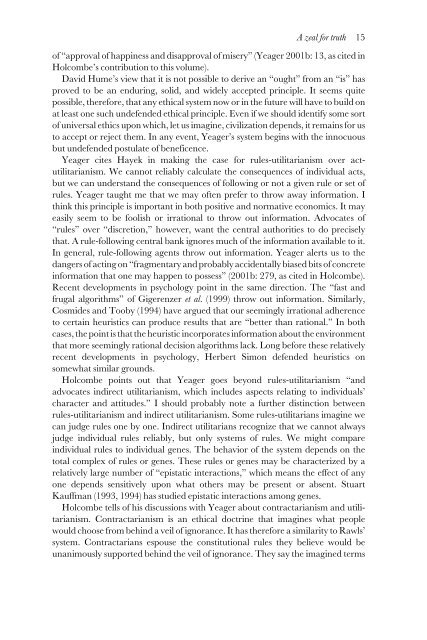Money and Markets: Essays in Honor of Leland B. Yeager
Money and Markets: Essays in Honor of Leland B. Yeager
Money and Markets: Essays in Honor of Leland B. Yeager
You also want an ePaper? Increase the reach of your titles
YUMPU automatically turns print PDFs into web optimized ePapers that Google loves.
A zeal for truth 15<strong>of</strong> “approval <strong>of</strong> happ<strong>in</strong>ess <strong>and</strong> disapproval <strong>of</strong> misery” (<strong>Yeager</strong> 2001b: 13, as cited <strong>in</strong>Holcombe’s contribution to this volume).David Hume’s view that it is not possible to derive an “ought” from an “is” hasproved to be an endur<strong>in</strong>g, solid, <strong>and</strong> widely accepted pr<strong>in</strong>ciple. It seems quitepossible, therefore, that any ethical system now or <strong>in</strong> the future will have to build onat least one such undefended ethical pr<strong>in</strong>ciple. Even if we should identify some sort<strong>of</strong> universal ethics upon which, let us imag<strong>in</strong>e, civilization depends, it rema<strong>in</strong>s for usto accept or reject them. In any event, <strong>Yeager</strong>’s system beg<strong>in</strong>s with the <strong>in</strong>nocuousbut undefended postulate <strong>of</strong> beneficence.<strong>Yeager</strong> cites Hayek <strong>in</strong> mak<strong>in</strong>g the case for rules-utilitarianism over actutilitarianism.We cannot reliably calculate the consequences <strong>of</strong> <strong>in</strong>dividual acts,but we can underst<strong>and</strong> the consequences <strong>of</strong> follow<strong>in</strong>g or not a given rule or set <strong>of</strong>rules. <strong>Yeager</strong> taught me that we may <strong>of</strong>ten prefer to throw away <strong>in</strong>formation. Ith<strong>in</strong>k this pr<strong>in</strong>ciple is important <strong>in</strong> both positive <strong>and</strong> normative economics. It mayeasily seem to be foolish or irrational to throw out <strong>in</strong>formation. Advocates <strong>of</strong>“rules” over “discretion,” however, want the central authorities to do preciselythat. A rule-follow<strong>in</strong>g central bank ignores much <strong>of</strong> the <strong>in</strong>formation available to it.In general, rule-follow<strong>in</strong>g agents throw out <strong>in</strong>formation. <strong>Yeager</strong> alerts us to thedangers <strong>of</strong> act<strong>in</strong>g on “fragmentary <strong>and</strong> probably accidentally biased bits <strong>of</strong> concrete<strong>in</strong>formation that one may happen to possess” (2001b: 279, as cited <strong>in</strong> Holcombe).Recent developments <strong>in</strong> psychology po<strong>in</strong>t <strong>in</strong> the same direction. The “fast <strong>and</strong>frugal algorithms” <strong>of</strong> Gigerenzer et al. (1999) throw out <strong>in</strong>formation. Similarly,Cosmides <strong>and</strong> Tooby (1994) have argued that our seem<strong>in</strong>gly irrational adherenceto certa<strong>in</strong> heuristics can produce results that are “better than rational.” In bothcases, the po<strong>in</strong>t is that the heuristic <strong>in</strong>corporates <strong>in</strong>formation about the environmentthat more seem<strong>in</strong>gly rational decision algorithms lack. Long before these relativelyrecent developments <strong>in</strong> psychology, Herbert Simon defended heuristics onsomewhat similar grounds.Holcombe po<strong>in</strong>ts out that <strong>Yeager</strong> goes beyond rules-utilitarianism “<strong>and</strong>advocates <strong>in</strong>direct utilitarianism, which <strong>in</strong>cludes aspects relat<strong>in</strong>g to <strong>in</strong>dividuals’character <strong>and</strong> attitudes.” I should probably note a further dist<strong>in</strong>ction betweenrules-utilitarianism <strong>and</strong> <strong>in</strong>direct utilitarianism. Some rules-utilitarians imag<strong>in</strong>e wecan judge rules one by one. Indirect utilitarians recognize that we cannot alwaysjudge <strong>in</strong>dividual rules reliably, but only systems <strong>of</strong> rules. We might compare<strong>in</strong>dividual rules to <strong>in</strong>dividual genes. The behavior <strong>of</strong> the system depends on thetotal complex <strong>of</strong> rules or genes. These rules or genes may be characterized by arelatively large number <strong>of</strong> “epistatic <strong>in</strong>teractions,” which means the effect <strong>of</strong> anyone depends sensitively upon what others may be present or absent. StuartKauffman (1993, 1994) has studied epistatic <strong>in</strong>teractions among genes.Holcombe tells <strong>of</strong> his discussions with <strong>Yeager</strong> about contractarianism <strong>and</strong> utilitarianism.Contractarianism is an ethical doctr<strong>in</strong>e that imag<strong>in</strong>es what peoplewould choose from beh<strong>in</strong>d a veil <strong>of</strong> ignorance. It has therefore a similarity to Rawls’system. Contractarians espouse the constitutional rules they believe would beunanimously supported beh<strong>in</strong>d the veil <strong>of</strong> ignorance. They say the imag<strong>in</strong>ed terms
















